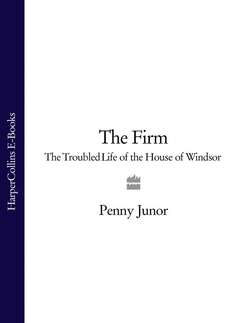Читать книгу The Firm: The Troubled Life of the House of Windsor - Penny Junor - Страница 17
ELEVEN From Bad to Worse
ОглавлениеHaving watched the Royal Family from the sidelines all these years, I never cease to be amazed by their resilience. Crises have come and gone, crises that would have crippled most individuals, families, even institutions, but they simply keep going, keep on doing what they have always done, nine times out of ten not even acknowledging whatever has happened, and miraculously the crisis fades. It is a brilliant strategy for survival and probably the only one that could work for a family so remorselessly in the limelight from cradle to coffin. They have no alternative but to take the long view, and recognize that, long term, very little really matters. But after an intimate late-night telephone conversation between Charles and Camilla was taped, published in the British press and devoured by millions over their breakfast cornflakes, I did wonder how the Prince of Wales would recover from this one. The man wanted to be a Tampax. How do you hold up your head in public after everyone you meet knows that? He wanted to be a Tampax to be as close as he could to Camilla. It was a playful conversation any two people very much in love and missing one another might have had and, read in its entirety, the eleven-minute conversation was rather touching; but you would rather slit your throat than contemplate one solitary soul overhearing you, let alone millions of people all over the world.
The tape was a compilation of several different conversations held over several months in 1989, but that was irrelevant. No one could deny that the voices were authentic; the Prince’s humiliation and embarrassment were total. He knows that it will come back to haunt him – it will be dredged up at his coronation and at other serious moments in his life – and serve to humiliate his parents, his sons and Camilla’s family, too. And yet the day the tapes were published he had an engagement in Liverpool and, instead of finding some excuse to cancel, as any ordinary person would, he stepped out of his car that morning to face the waiting crowds as though absolutely nothing had happened. The courage it took was immeasurable; he had no idea what kind of reception awaited him, but to the intense relief of everyone with him there were no sniggers, no shouts, no catcalls and no absence of people. Yet for all his cool, it was one of the worst days of his life, made worse by the damage he knew he had inflicted yet again on the monarchy.
There were lurid headlines and cartoons in the press, wide condemnation of Charles, questions about his fitness to be king, and, in the mounting fever of puritanical indignation, demands from Cabinet ministers that the Prince give up Mrs Parker Bowles.
The contents of her mailbag, meanwhile, took on an even more unpleasant tone and the press presence and pressure at her house became even worse. She became the butt of jokes up and down the country, her children at boarding school were teased and tormented and her husband stood publicly cuckolded.
It was at this point, with the documentary underway, that Jonathan Dimbleby and the Prince’s adviser, Richard Aylard, discussed the question of the Prince’s adultery. With the Morton book published, two sets of tapes in the public arena and screeds written in the press, it was an issue that no film about the last twenty-five years could duck. Dimbleby would have to ask the question; what Aylard and the Prince had to decide was how best to reply? There were three options. The truth, a lie, or evasion. Aylard advised the first, which accorded with the Prince’s inclination. If he lied then sooner or later he would be caught out, argued the Private Secretary. The News of the World, he knew, already had both the Prince and Camilla watched and followed round the clock; it was only a matter of time before they were seen together or a disaffected servant sold his story. If he refused to answer the question on the grounds that it was a personal matter the surveillance would continue and the story would never go away until the media had evidence of an affair. After the ‘Camillagate’ tape, most people believed they were lovers, so why not be honest with the British public and admit the truth? The Prince wanted to tell the truth and Aylard encouraged him.
What they should both have foreseen was that the great British public was more interested in Diana’s truth. She had got hers in first and it had a far juicier ring to it. They heard the ‘Yes’, and completely ignored the rest of his sentence which came after an anguished pause, ‘the marriage having irretrievably broken down, us both having tried’, and concluded that Charles had been an adulterer from day one. When Aylard confirmed at a press conference the next day that the adultery to which the Prince had confessed had indeed been with Mrs Parker Bowles, her goose was finally cooked. Andrew Parker Bowles filed for divorce and, less than a year later, married his long-term girlfriend, Rosie Pitman. The public blamed Camilla for breaking up the royal family home, and the reputation of the monarchy was once again dragged through the mire.
